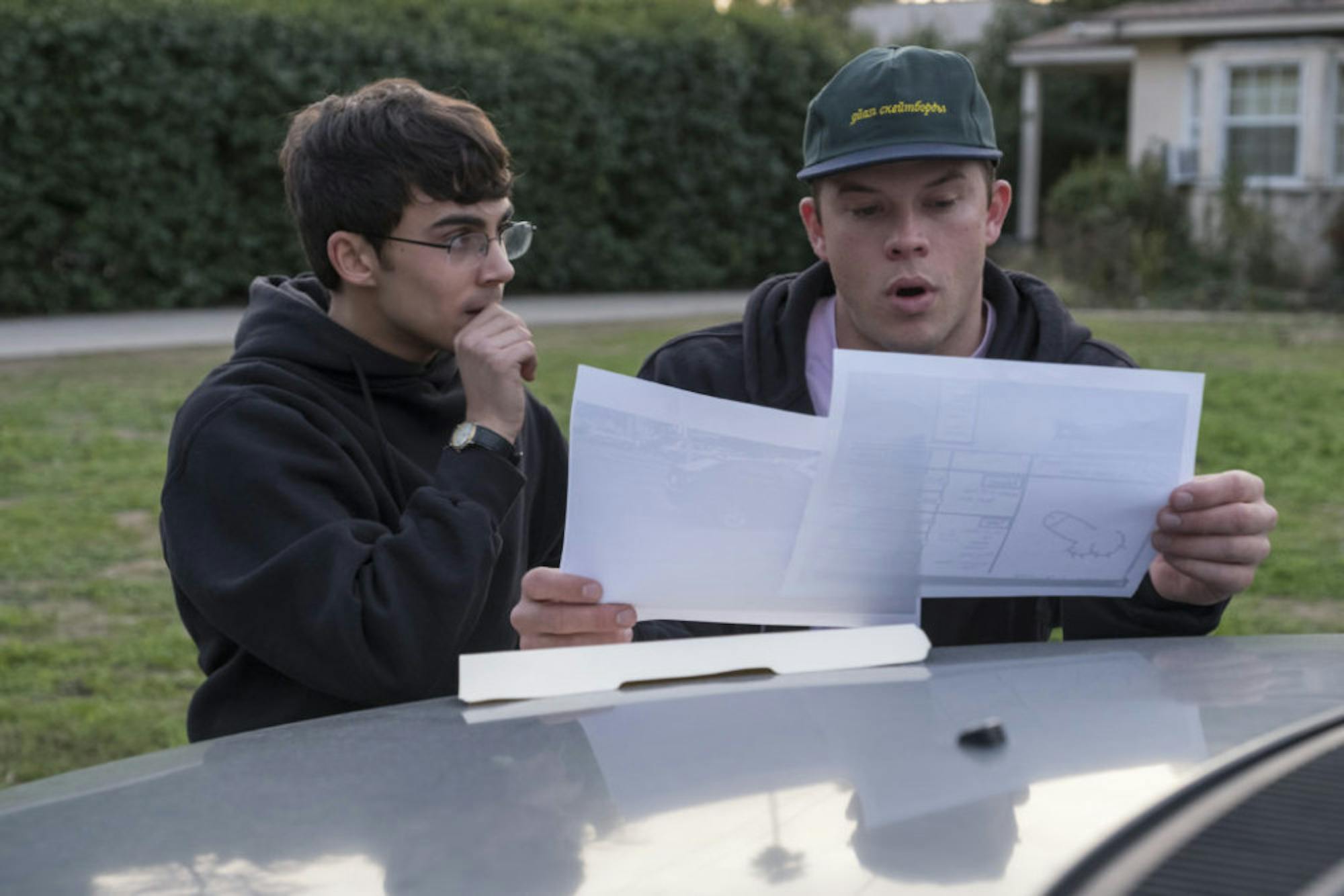
“Please state your name and who you are.”
A boy with greasy hair, a graphic T-shirt and a hoodie featuring a cupcake design pauses before speaking. “My name is Dylan Maxwell, and I’m — ”
He twiddles his thumbs. He looks behind the camera for support.
“I don’t know dude, I’m just Dylan. What do you mean, ‘Who am I?’ That’s a stupid question.”
And so begins “American Vandal,”the new soon-to-be cult classic from Netflix in partnership with Funny or Die. Flush with innuendo, self-awareness and unexpected meaning, the eight-episode saga deserves all the praise it will soon accrue.
The premise of the show is crude: High school senior Dylan Maxwell (Jimmy Tatro) stands convicted of spray painting “male sexual organs” on every teacher’s car at Hanover High School. Unjustly expelled and ridiculed, his only saving grace is sophomore and aspiring documentarian Peter Maldonado (Tyler Alvarez), who takes it upon himself to prove Dylan’s innocence. What follows is a tour-de-force of drama, empathy and tension, all united under the common umbrella of phallic humor. Friends become enemies. Enemies become friends.
But at the core of it all, the poignancy of Dylan’s personal struggle never dulls. His physical punishment, expulsion, only represents his larger issue of societal condemnation. To be clear, Dylan is a social reject. Along with his group of stoner friends, The Wayback Boyz, he makes YouTube videos including “Baby Farting,” “Nuns Humping Trees” and “Nuns Humping Trees 2.” He goes out of his way to annoy teachers, alienate students and aggravate those around him.
Dylan antagonizes people, but he’s not an antagonist. The thematic subtext of the series thrives at the delineation between authenticity of character and perceived appearance. Early in the show, Dylan faces a trial in front of the school board to determine his innocence or his guilt. But as his stepfather Greg (Larry Campbell) later explains, “He wasn’t walking into a trial. He was walking into an execution.”
The board tears Dylan apart, playing his unintelligible YouTube videos in their entirety, listening to biased testimonies against him and denigrating his intelligence. Though no one can prove that he’s guilty of this particular crime, he becomes a known criminal.
The series never demonstrates that Dylan is a genius, a good Samaritan or even a person undeserving of his status. Instead, the series emphasizes Dylan’s humanity. Even if his relationship is questionable, he loves his girlfriend. Even if his friends are unreliable, he trusts them. Even though he doesn’t take school seriously, he understands the value of education. In assigning Dylan the title of “stoner” or “dropout,” we limit him to achieve only what that characterization can achieve, trivializing his personal relationships and values.
Though Dylan struggles to cope with others’ perception of him, he is not alone. Some audience members laugh when we see the hot girl hooking up with the nerd, a linebacker decking the annoyingly active class president and the meek sophomore getting overwhelmed by his first beer (and then his next 10). “American Vandal”portrays these moments in a funny and lighthearted way, but still conveys the consequences. The hot girl is frustrated that her promiscuity has become a talking point. The class president breaks her leg. The meek sophomore ends up in the hospital, nearly dead from alcohol poisoning.
Where most comedies would simply drop the subject after the laugh, “American Vandal”is a continuous punchline interwoven with emotional truth. Sure, it delivers on some fantastic laughs, but it also implores audience members to think about how we empathize with one another. Some viewers, including myself, knew a “Dylan” in high school who made rash decisions, took pleasure in stupid humor and almost flunked out. How much of their actions are a result of what we ascribe them to be? If someone thought of Dylan, the hot girl or the class president as anything more than their labels, could they have changed?
“American Vandal”doesn’t answer those questions. But in posing them, it challenges viewers to reevaluate how they perceive and treat those whom they often don’t think about.
It’s also got a lot of great d*ck jokes.
This brings us back to the first scene of the show, the perfect opener for what’s to come. We, behind the camera, instantly ask, “Who are you?” Despite all the humor that comes from Dylan’s blunt honesty, he’s got a point: “It’s a stupid question.”
It takes time to get to know someone authentically, and by attempting to rush that process, people reveal their own naivety. Throughout the show, viewers get to know Dylan authentically: his problems, his values and, ultimately, his story. It’s time well spent.
Grade: A+
'American Vandal' is a Wise, Thoughtful Phallic Parade
Courtesy of Tyler Golden/Netflix








